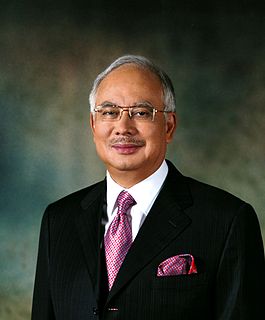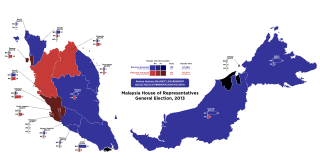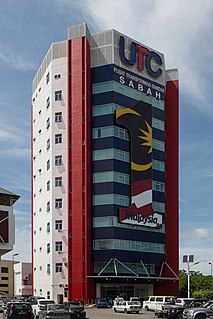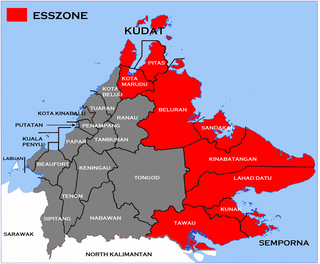Related Research Articles
The primary regulator of telecommunications in Malaysia is the Malaysian Communications and Multimedia Commission (MCMC). It issues licenses under the Communications and Multimedia Act 1998, the Postal Services Act 2012 and the Digital Signature Act 1997.

Dato' Sri Haji Mohammad Najib bin Tun Haji Abdul Razak is a Malaysian politician and kleptocrat who served as the sixth prime minister of Malaysia from April 2009 to May 2018. In 2020, he was convicted of corruption in the 1Malaysia Development Berhad scandal, one of the largest money-laundering scandals in history. He is the son of former prime minister Abdul Razak Hussein. Najib was the chairman of the Barisan Nasional (BN) coalition from April 2009 to May 2018 and the president of the United Malays National Organisation (UMNO) from November 2008 to May 2018, which had maintained control of Malaysia's government with a parliamentary majority for more than sixty years until the coalition's defeat in the 2018 general election. One of the most controversial leaders of the 21st century, Najib's rule was infamous for its corruption, extravagance, and crackdown on free speech.

Malaysian television broadcasting was introduced on 28 December 1963. Colour television was introduced on 28 December 1978. Full-time colour transmissions were officially inaugurated on New Year's Day 1982. There are currently 18 national free-to-air terrestrial television stations in Malaysia and 2 national pay subscription television stations in Malaysia.

Telekom Malaysia Berhad (TM) is a Malaysian telecommunications company founded in 1984. Beginning as the national telecommunications company for fixed line, radio and television broadcasting services, it has evolved to become the country's largest provider of broadband services, data, fixed-line, pay television and network services. TM ventured into the Long Term Evolution (LTE) space with the launch of TMgo, its first 4G offering. TM's 850 MHz service was rebranded as unifi Mobile in January 2018.

The Malaysian Communications and Multimedia Commission is a regulatory body whose key role is the regulation of the communications and multimedia industry based on the powers provided for in the Malaysian Communications and Multimedia Commission Act 1998, the Communications and Multimedia Act 1998, and the Strategic Trade Act 2010. MCMC is similar to the National Telecommunications Commission (NTC) in the Philippines. Its role to implement and promote the Government's national policy objectives for the communications and multimedia sector. MCMC is also charged with overseeing the new regulatory framework for the converging telecommunications and broadcasting industries and online activities. In 2001, MCMC's role was expanded to include overseeing the postal service sector pursuant to the Postal Services Act 1991 and licensing of the Certification Authorities under the Digital Signature Act 1997.
From its beginnings in 1995, the Internet in Malaysia has become the main platform for free discussion in Malaysia's otherwise tightly controlled media environment. As of Q1 2017, Malaysia has broadband penetration rates of 103.6% and 81.8%.
In Malaysia, digital television broadcasts, DTV or DHD, can be received via cable, internet, satellite, or via free over-the-air (OTA) digital terrestrial television - much like analogue television broadcasts have been. It began in the mid-1990s with the introduction of the Astro satellite television service, now followed by new paid television services in the 2000s, as well as the digitalisation of over-the-air TV which was expected to be complete by the mid-2010s before being shelved. This article discusses various platforms where DTV is applied in Malaysia, including Digital Video Broadcasting (DVB) and Internet Protocol Television (IPTV). Following its successful nationwide digital transition on 31 October 2019, the country became the third in Southeast Asia with digital broadcasts after neighbouring Brunei and Singapore.

General elections were held in Malaysia on Sunday, 5 May 2013 to elect the members of the 13th Parliament. Voting took place in all 222 parliamentary constituencies, each electing one MP to the Dewan Rakyat, the dominant house of Parliament. State elections also took place in 505 state constituencies in 12 of the 13 states on the same day.
1Malaysia is a programme designed by Malaysian 6th Prime Minister Najib Tun Razak in summer 2009 with the stated goal of promoting ethnic harmony, national unity, and efficient governance.

The Government Transformation Programme (GTP) is an effort by Malaysia's Government to address seven key areas concerning the people of the country. The programme was unveiled on 28 January 2010 by the Malaysian Prime Minister Najib Tun Razak. and is expected to contribute in making the country a developed and high-income nation as per its Vision 2020.
The economic policy of the Najib Razak government marked a significant shift away from the state-oriented economic programmes of previous Malaysian governments. Najib Razak's government introduced various policies to liberalise the economy during his premiership from 2009 to 2018. This included a New Economic Model, subsidy reforms, international free trade agreements and stimulus packages.
Subsidy reform in Malaysia was initiated in July 2010 by Prime Minister Najib Razak via a reduction in subsidies for fuel and sugar. Further cuts in subsidies for these and other products are planned over a three- to five-year period to strengthen government finances and improve economic efficiency.

The Ministry of Communications and Multimedia, abbreviated K-KOMM, is a ministry of the Government of Malaysia that is responsible for communications, multimedia, broadcasting, information, personal data protection, special affairs, media industry, film industry, domain name, postal, courier, mobile service, fixed service, broadband, digital signature, universal service, international broadcasting, content.

The Urban Transformation Centre (UTC) is a public amenities centre located at some state capitals and urban areas in Malaysia. The rural counterpart of UTC is Rural Transformation Center(RTC).

The Eastern Sabah Security Zone (ESSZONE) is a security zone in the Malaysian state of Sabah that was launched by Malaysian Prime Minister Najib Razak on 25 March 2013 following persistent attacks by pirates and militants from the southern Philippines that occurred in the eastern part of Sabah especially after the 2013 Lahad Datu standoff. It includes the districts of Kudat, Kota Marudu, Pitas, Beluran, Sandakan, Kinabatangan, Lahad Datu, Kunak, Semporna and Tawau.
The 2014–2015 Malaysia floods affected Malaysia from 15 December 2014 – 3 January 2015. More than 200,000 people were affected while 21 were killed. These floods have been described as the worst in decades.
The Malaysian federal budget for 2014 fiscal year was presented to the Dewan Rakyat by Prime Minister and Minister of Finance, Najib Razak on Friday, 25 October 2013.
Shared Prosperity Vision 2030, is a government blueprint released in 2020 by the Government of Malaysia for the period of 2021 to 2030 to increase the incomes of all ethnic groups, particularly the Bumiputera comprising the B40, the hardcore poor, the economically poor, those in economic transition, Orang Asli, Sabah and Sarawak bumiputeras, the disabled, youths, women, children and senior citizens.
Events in the year 2021 in Malaysia.
The Government of Malaysia along with various non governmental organisations (NGOs), companies, and foreign governments introduced various financial aid and relief programs in response to the economic impacts of the COVID-19 pandemic in Malaysia. In 27 March 2020, Prime Minister Muhyiddin Yassin introduced an economic stimulus package known as the Prihatin worth RM250 billion.
References
- 1 2 3 Malaysia on Track to Achieving 50 Pct Broadband Penetration by Year-End, Bernama, 12 March 2010.
- ↑ National Broadband Initiative, Malaysia Communications and Multimedia Commission
- 1 2 3 RM1 billion initiative to promote high-speed broadband usage, by Sira Habibu and Shaun Ho, The Star, 25 March 2010
- ↑ Malaysia's Broadband Initiative Seen Boosting Eco Growth, Tradingmarkets.com, 26 March 2010.
- 1 2 9,500 1Malaysia Netbooks Distributed In Sabah, Bernama, 1 December 2010
- ↑ 877,000 More 1Malaysia Netbooks For Students, Bernama, 28 August 2010